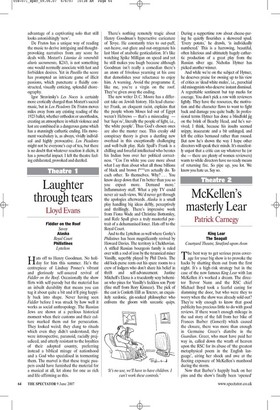Laughter through tears
Lloyd Evans Fiddler on the Roof Savoy Alaska Royal Court Philistines Lyttelton Hats off to Henry Goodman. No holiday for him this summer. He's the centrepiece of Lindsay Posner's vibrant and gloriously self-assured revival of Fiddler on the Roof. Occasionally the show flirts with self-parody but the material has an inbuilt durability that means you can tug it about quite a bit and it'll ping happily back into shape. Never having seen Fiddler before I was struck by how well it works as social anthropology. The Russian Jews are shown at a perilous historical moment when their customs and their culture marked them out for persecution. They looked weird; they clung to rituals which even they didn't understand; they were introspective, paranoid, racially prejudiced, and utterly resistant to the loyalties of their adopted country, preferring instead a biblical mirage of nationhood and a God who specialised in tormenting them. The marvel is that these tragic paupers could have furnished the material for a musical at all, let alone for one as rich and life-affirming as this.
There's nothing remotely tragic about Henry Goodman's hyperactive caricature of Tevye. He constantly tries to out-puff, out-heave, out-glare and out-oxygenate his last blast of anabolic gesticulation. It's like watching Spike Milligan on speed and yet he still makes you laugh because although Goodman isn't really a comedian there's an atom of frivolous yearning at his core that demolishes your reluctance to enjoy him A warning. Avoid the programme if, like me, you're a virgin on the roof. They've given away the ending.
The new writer D. C. Moore has a different take on Jewish history. His lead character Frank, an eloquent racist, explains that the people whom Moses led out of Egypt weren't Hebrews — that's a misreading — but `hapi ru', literally the people of light, i.e., `the white people'. Thus God's chosen ones are also the master race. This creaky old conspiracy theory is given a dazzling new overhaul in this exceptionally challenging and well-built play. Rafe Spa11's Frank is a chilling and forceful intellectual who berates his Indian boss over her political correctness. "Cos I'm white you care more about what I say than about what all those billions of black and brown f***ers actually do. To each other. To themselves. Why? . . . You know deep down that I'm better than you so you expect more. Demand more.' Inflammatory stuff. What a pity TV could never air such views. We'd never get through the apologies afterwards. Alaska is a small play handling big ideas deftly, perceptively and thrillingly. There's impressive work from Fiona Wade and Christine Bottomley, and Rafe Spall gives a truly masterful portrait of a dehumanised loner. Hats off to the Royal Court.
And to the Lyttelton as well where Gorky's Philistines has been magnificently revived by Howard Davies. The territory is Chekhovian. A stifled Russian bourgeois family is ruled over with a rod of iron by the tyrannical miser Vassilly, superbly played by Phil Davis. The old lock-purse rents out his spare rooms to a crew of lodgers who don't share his belief in thrift and self-advancement. Justine Mitchell's Elena is a truculently sexy bohemian who pines for Vassilly's feckless son Pyotr (fine stuff from Rory Kinnear). The pick of the cast is Conleth Hill as Teterev, an exquisitely sardonic, gin-soaked philosopher who enlivens the gloom with sarcastic quips.
During a suppertime row about cheese-paring he quietly flourishes a skewered spud. 'Every potato,' he drawls, 'is individually numbered.' This is a harrowing, beautiful, often hilarious and ultimately hugely cathartic production of a great play from the Russian silver age. Nicholas Hytner has picked another winner.
And while we're on the subject of Hytner, he deserves praise for owning up to his view of critics as 'dead white males', i.e., parochial old misogynists who deserve instant dismissal. A regrettable sentiment but top marks for courage. You don't pick a row with reviewers lightly. They have the resources, the motivation and the character flaws to want to fight back and damage you quite badly. In professional terms Hytner has done a blindfold jig on the brink of Beachy Head, and he's survived, I think, because his insults seemed snippy, inaccurate and a bit unhinged, and left the critics bemused rather than roused. But now he's shown the way I hope other directors will speak their minds. It's manifestly unjust that a critic can say whatever he (or she — there are plenty of women reviewers) wants to while directors have no ready means of returning fire. So pipe up, you lot. We know you hate us. Say so.




























































 Previous page
Previous page